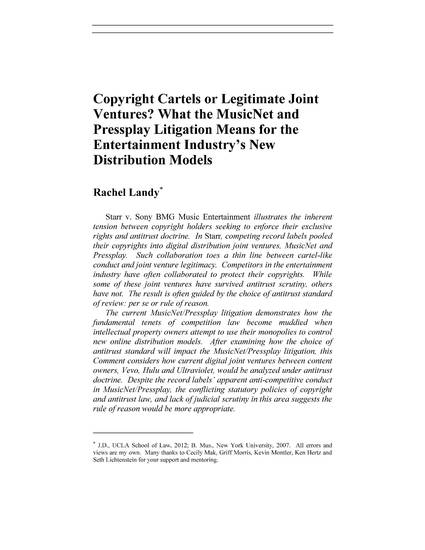
Article
Copyright Cartels or Legitimate Joint Ventures? What the MusicNet and Pressplay Litigation Means for the Entertainment Industry's New Distribution Models
UCLA Entertainment Law Review
(2012)
Abstract
Starr v. Sony BMG Music Entertainment illustrates the inherent tension between copyright holders seeking to enforce their exclusive rights and antitrust doctrine. In Starr, competing record labels pooled their copyrights into digital distribution joint ventures, MusicNet and Pressplay. Such collaboration toes a thin line between cartel-like conduct and joint venture legitimacy. Competitors in the entertainment industry have often collaborated to protect their copyrights. While some of these joint ventures have survived antitrust scrutiny, others have not. The result is often guided by the choice of antitrust standard of review: per se or rule of reason
The current MusicNet/Pressplay litigation demonstrates how the fundamental tenets of competition law become muddied when intellectual property owners attempt to use their monopolies to control new online distribution models. After examining how the choice of antitrust standard will impact the MusicNet/Pressplay litigation, this Comment considers how current digital joint ventures between content owners, Vevo, Hulu and Ultraviolet, would be analyzed under antitrust doctrine. Despite the record labels' apparent anti-competitive conduct in MusicNet/Pressplay, the conflicting statutory policies of copyright and antitrust law, and lack ofjudicial scrutiny in this area suggests the rule of reason would be more appropriate.
Disciplines
Publication Date
2012
Citation Information
Rachel Landy. "Copyright Cartels or Legitimate Joint Ventures? What the MusicNet and Pressplay Litigation Means for the Entertainment Industry's New Distribution Models" UCLA Entertainment Law Review Vol. 19 Iss. 2 (2012) p. 371 - 405 Available at: http://works.bepress.com/rachel-landy/4/
